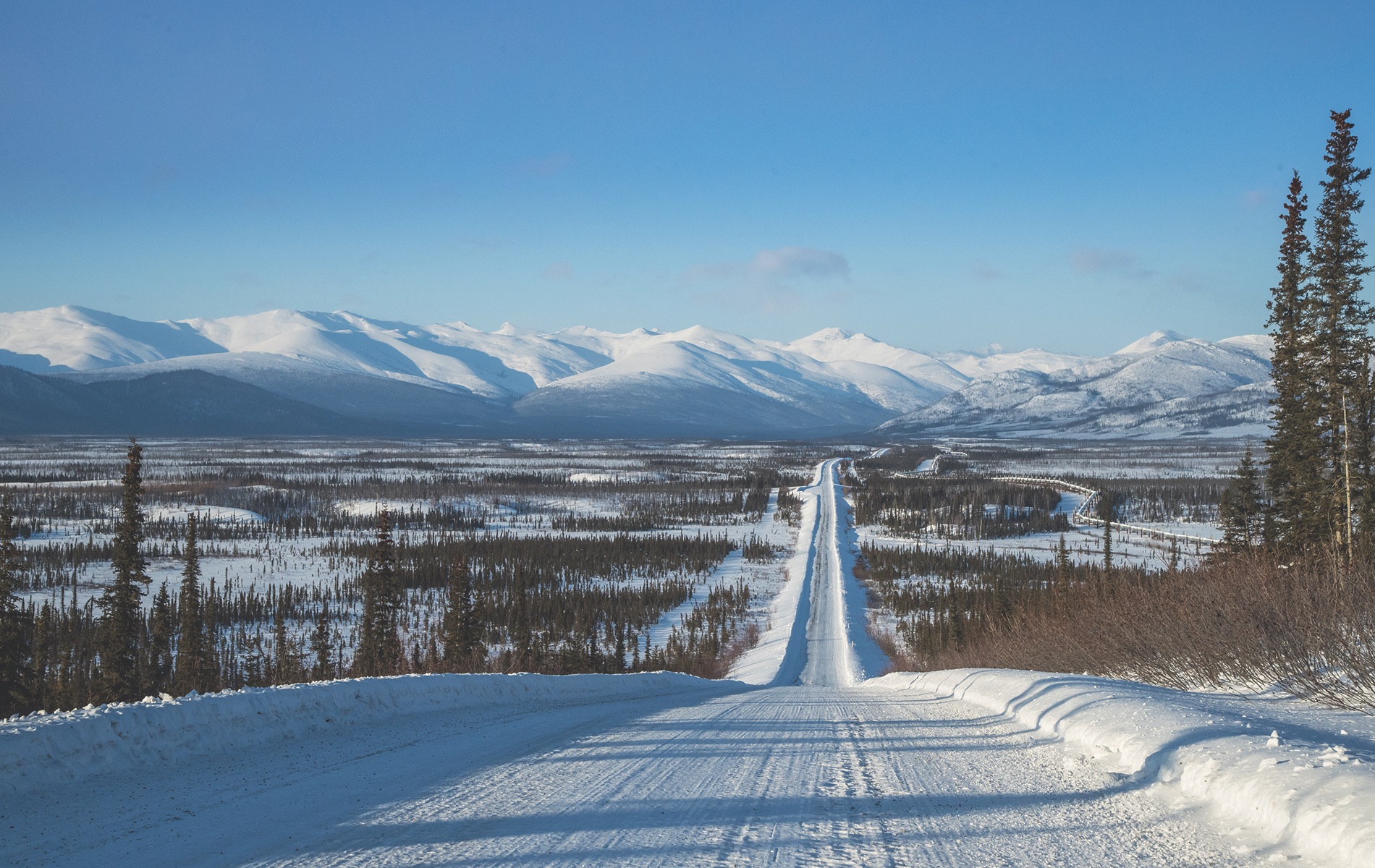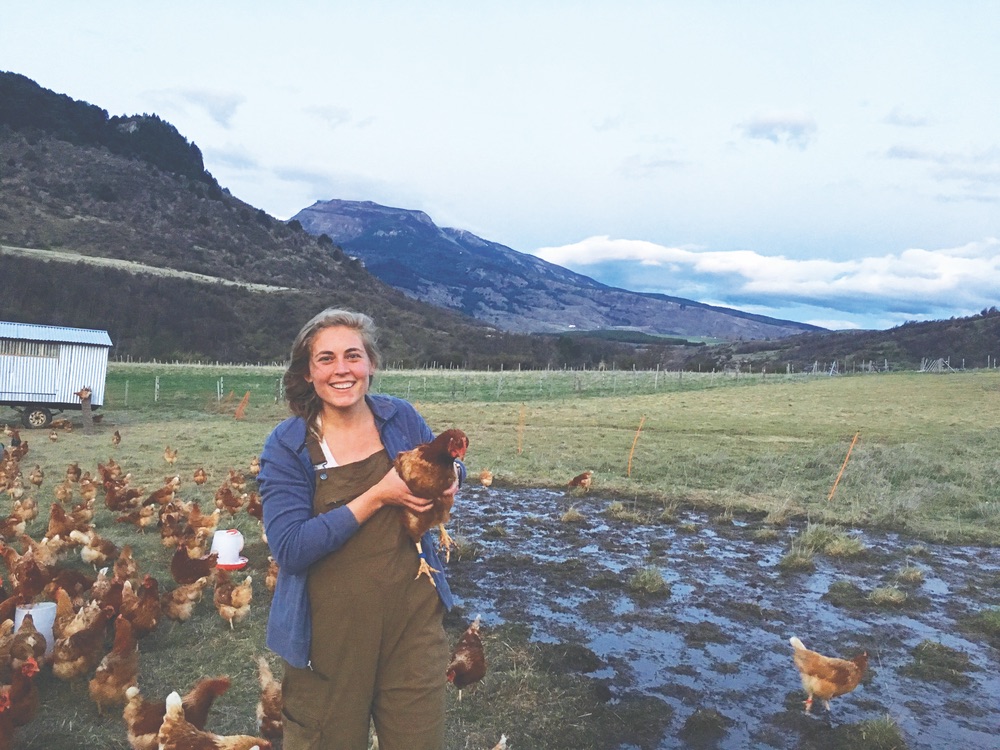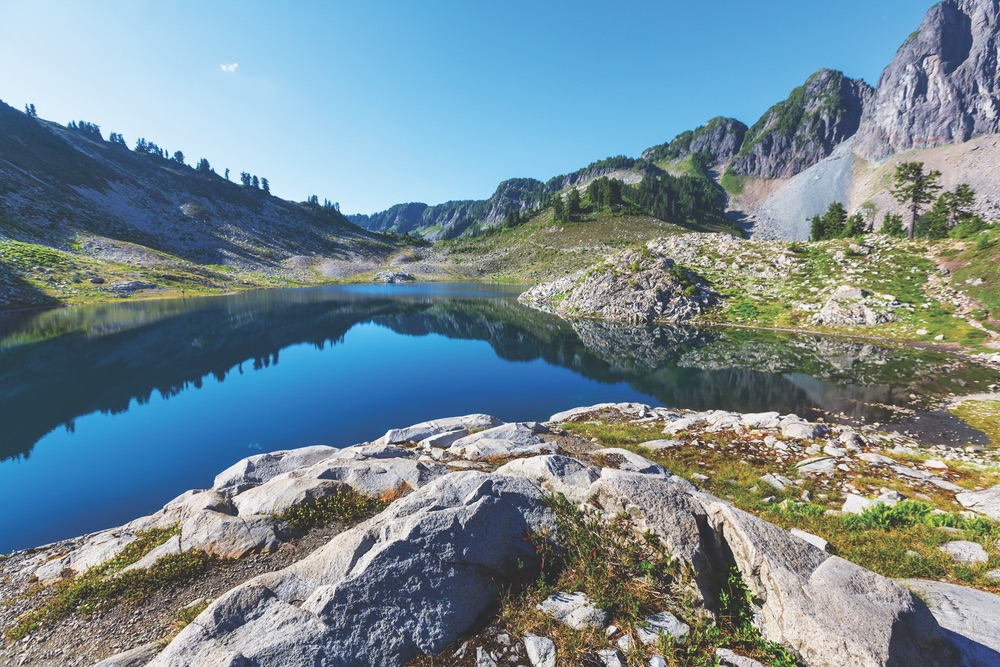
vie-magazine-women-in-remote-jobs-hero
Coldfoot, Alaska, lies along the Dalton Highway in the Arctic Circle, an isolated camp that offers a harsh environment but rewarding work for employees like Rebecca Hicks. The highway, built as a supply road to the Trans-Alaska Pipeline System, has been the subject of episodes of America’s Toughest Jobs and World’s Most Dangerous Roads.
The Everywoman
A Tale of Unexpected Choices
By Lizzie Locker
Once upon a time, my sister Janie was a banker. She was certainly suited for it—a left-brained artist with talents for all the things I have never even been able to begin to understand: math, logic, straight lines, realism. Janie has a will of granite and a razor-wire personality—she’s ruthless, fearless. She was recruited by BBVA Compass right out of college, and a year later she was asked to move from Birmingham, Alabama, to Seattle to be the commercial relationship associate at their newest loan production office.
Of course, I was proud of her, a sharp young woman working in a seventy-second-floor office full of old men, making more money than I could wrap my head around, teaching self-defense workshops in the park with her kickboxing class. She had lived up to every expectation she had ever placed on herself, a success in every way.
Success doesn’t necessarily equal happiness, though. And Janie does not compromise.
So my sister did a thing both brave and dangerous: she hit the reset button.
Rebecca Hicks is another little sister of mine, a soror of a sort. We met in college in Mississippi, where she majored in culinary arts. I was one of the lucky few who got to enjoy her class work—caramel cheesecake to curl your toes, slap-yo-mama-good biscuits and gravy—hand-delivered to the study room where my bosom heaved over the Romantics section of my Norton Anthology.
Rebecca had grown up in our college town, and at the first opportunity she was gone like a shot. She took an internship as far from Mississippi as she could manage, at a dude ranch in California. There she was introduced to a very different lifestyle—seasonal work in remote locations. She found that she thrived in small, close-quartered communities. That she had the fortitude to work twelve-hour shifts every day for weeks without a break. That she was tough enough to tangle with the meanest bosses and the skeeviest coworkers, and tough enough to win.

Janie Locker pursued happiness by giving up life in the banking industry and taking a job on a farm and then a cattle and yak ranch near Seattle.
This sister, too, did a thing brave and dangerous: she moved to the edge of the world.
Janie doesn’t always like to get personal, even with me. But when I ask her why she left behind the so-called good life for the one she leads now, the words flow easily. “I was doing a job I didn’t find inspiring, and I felt like a little consuming machine. Money wasn’t interesting enough. I wanted to do something with my hands.”
On the phone, Janie’s voice is deep, still rough from the cold that has lingered with her for weeks. “Today has been a nightmare,” she says. She tells me about her morning, spent desperately trying to haul up yet another cow who had slipped on freshly cleaned concrete and couldn’t stand up again, a convoluted and frustrating series of events involving tractors, open gates, and escaping heifers.
“I like being active in my job, outside around beautiful things, taking care of beautiful things that make me happy.”
Our father was a cattle farmer, so I understand the kind of physical endurance and mental fortitude necessary to make it through a single day. I tell her she’s a beast, an Amazon; I can hear her making a face over the phone. “I’ve never enjoyed making myself work out,” she says. “I like being active in my job, outside around beautiful things, taking care of beautiful things that make me happy.”
“But the yaks,” she continues, “they’re the mischievous ones.”
It’s been almost a year since Janie quit her job and her life in Seattle to pursue a hands-on education in farming, and her year has been almost nothing but winter. In June, she left behind the Northern Hemisphere’s summertime to complete a volunteer work-stay program on a farm in Chile, where her primary job was to help care for nine hundred laying hens. She fed and watered the animals, collected and washed the eggs, and carried hundreds of eggs at a time half a mile uphill.
Most work-stay programs don’t require quite as much effort from their volunteers, but Janie has always been one to push her own limits. “I chose that farm because they had such high expectations of their volunteers. I wanted to learn as much as I could.”
As Janie’s work-stay drew to a close, her hosts put her in touch with Sandra Matheson, a cow and yak farmer in Bellingham, Washington, who was in need of an intern for the following November.
“We talked once on the phone and that was it,” Janie says.
Matheson Farms is a humane, environmentally conscious, farm-to-table beef operation that sells whole cows and yaks as well as specific cuts of beef directly to the consumer. It’s a model that appeals to Janie, who has always been deeply conscientious of the ethics of her interests.
Her days were backbreaking, spent hacking through iced-over water troughs and moving fallen, ice-encrusted branches from electric fence lines.
At heart, it’s not entirely dissimilar from the farm where we grew up; but winter in Washington is a very different beast from winter in Alabama. For a few weeks, Janie’s entire existence was simply focused on keeping the animals alive through a bitter freeze. Her days were backbreaking, spent hacking through iced-over water troughs and moving fallen, ice-encrusted branches from electric fence lines. “That’s basically all I did those weeks,” she says, “feed them and keep the water flowing and get back inside to the fire.”
When Janie’s voice cracks over the phone, I think of ice cracking as it thaws. In the photos she sends me, of herself holding a newborn calf or standing next to the tractor, she is smiling in a way she has never smiled in photos before. She is smiling from genuine happiness, not posing for the camera. She is herself, overalls and boots and flyaway hairs escaping from her ponytail, and for the first time in a long time, she seems like she has everything she wants.
Rebecca moved to Coldfoot, Alaska, a few years ago on a whim. “I didn’t even know what Coldfoot was; I just applied to it along with a handful of other seasonal jobs I found online. But after the interview process and everything, I just thought, why not?”
Coldfoot isn’t a town. It isn’t even a village. It’s a camp, a way station along Alaska’s Dalton Highway in the Arctic Circle. The camp includes a small café and gift shop, a modest motel for pipeline workers and travelers, and a gas pump.
Coldfoot Camp is one of the loneliest outposts of civilization in our most gargantuan state, located 260 miles north of the nearest traffic light (in Fairbanks) and 240 miles south of Prudhoe Bay. But until you’ve visited, which I did last April, the gravity of that isolation doesn’t really register.
Imagine a place surrounded by mountains, drifted in snow that disguises pathways and befuddles your sense of direction. Imagine a gray sky so bright that your eyes feel like they’ll burst despite the cloud cover, and a sun so close to the earth that it seems like you can feel the radiation before you feel the heat, a sun that seems never to fully set. Imagine that walking a hundred yards could deliver you out of the protective arms of humanity—that a hundred yards down the path you might find yourself face-to-face with a mother bear or a bull moose ready to charge. If you were to take so much as a single step off the hard-packed snow path and become stuck in a snowbank, a hundred yards away from home, in that primeval place, might as well be a hundred miles.
Rebecca downplays the job itself —she could be a line cook anywhere, she says. But to me, she’s an angel of mercy, ministering to forgotten souls on the edge of the world.
Rebecca works as a line cook in the café, one of a couple dozen seasonal workers employed in a variety of odd jobs around the camp: cleaning, giving tours, maintaining the camp, et cetera. Rebecca downplays the job itself —she could be a line cook anywhere, she says. But to me, she’s an angel of mercy, ministering to forgotten souls on the edge of the world. She told me a story once, of how a pair of big-game hunters who’d been camping for weeks had walked into the restaurant at four in the morning, long before breakfast would be served. They were desperate for a hot meal after weeks of jerky and campfire food, and Rebecca had kindly made them a couple of sandwiches to tide them over until the restaurant opened. She said the two men had seemed ready to cry when she brought them their plates.
That’s just one example of how basic amenities become luxuries. During the summertime, Rebecca lives in a three-season tent with no electricity or solid walls, but during the bitter winters, when the sun goes away for months, she moves into a dormitory-style building. Satellite Wi-Fi is available, but it’s shoddy and expensive and not worth bothering with unless absolutely necessary. There is no cell service of any kind, and heat sources are not always consistent or reliable. All electricity comes from generators, which can overheat or give out. “I’ve definitely finished a couple of order tickets in the dark or with a headlamp,” Rebecca says.
It’s not a comfortable life, to be sure, when the temperature falls to -55°F and you still have to get out of bed and go outside. And the distance from civilization—the distance from home—can be taxing. “I have two nieces and a nephew,” Rebecca says, “all under ten years old, and I worry about them forgetting me. I’ve lost a couple of family members while I was up here, which was hard. Then there’s everything that’s been going on politically and wanting to stand up for what I believe in.”
But it’s not without its rewards, either. Her job pays well, her housing is covered, and in a few short years, she’ll have paid off her student loans. “This place is fulfilling. It’s so peaceful. We can lie out on a frozen pond and see the whole Milky Way, not to mention the Aurora Borealis! That’s enough to keep me coming back.”
“This place is fulfilling. It’s so peaceful. We can lie out on a frozen pond and see the whole Milky Way, not to mention the Aurora Borealis! That’s enough to keep me coming back.”
Both my sister and my sort-of sister are living the life unexpected, and while it’s hard to watch them struggle and suffer, it’s worth it to see them both fulfilling the missions they have set for themselves: learning, adventuring, blazing trails for themselves and other women like them.
As Janie says her good-byes to me on the phone, she seems to be speaking for herself and Rebecca both: “The people I meet who do this, it’s like they’re doing all the hard work so that others don’t have to. And I’m gonna make sure it’s done right.”
One woman alone cannot be everywhere. We get only one lifetime, so they say, and we are all born with too many dreams to fit into it. But Woman is everywhere, in the heartland and in the wasteland. Where you least expect to find us, there we will be, doing the work that needs doing.
— V —
Lizzie Locker is a writer, instructor, and costume designer in San Francisco. She received her MFA in writing from the University of San Francisco, where she was also awarded a teaching fellowship. Lizzie is currently at work on her first novel.
Share This Story!
KEEP UP WITH THE LATEST STORIES FROM VIE



















































































































































